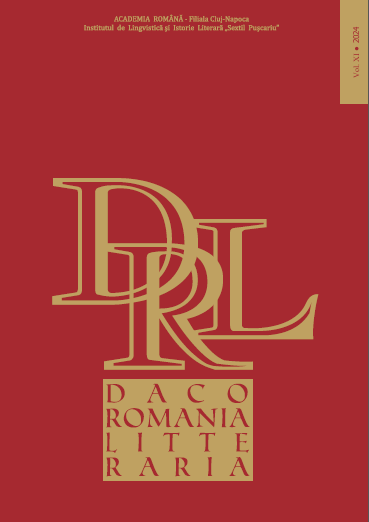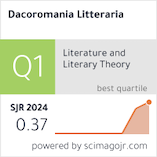11 |
2024
New Methodologies in the Study of the Romanian Novel
Dossier coordonné par / Edited by Daiana Gârdan, Emanuel Modoc

ISSN–L 2360 – 5189
[Text integral]
The transnational and the digital turns have significantly influenced literary studies over the past thirty years, positioning the novel as an ideal subject for examining innovative methodological and analytical approaches. As both a recipient and an initiator of socio-economic, political, and cultural tensions, the novel regains its societal role as a mirror and mediator of its source culture, particularly at local and regional levels. Consequently, new issues have arisen in recent research initiatives: the global dissemination of imported literary forms (considering the disparities in modernization between central and peripheral cultures), the transformation of these forms across various social, historical, and spatial contexts, and the emergence of subgenres with national or regional distinctions. In the realm of evolving literary criticism, which seeks to treat national literatures as part of the global literary landscape and employs statistical and computational techniques for sociological literature analysis, scholars exploring (semi)peripheral literary cultures have begun taking significant steps toward fresh literary interpretations since 2010. In Romania, new research directions have predominantly centered on novelistic works (both local and translated). To foster the growth of this research platform, the Romanian Academy’s Sextil Pușcariu” Institute of Linguistics and Literary History in Cluj-Napoca hosted in 2023 the inaugural International Conference for the Study of the Novel. This conference aimed at exploring the potential of utilizing traditional lexicographical tools (dictionaries focused on authors, literary works, periodicals, bibliographies, critical references, etc.) as (meta)data sources for novel studies. The event focused on the theoretical discussions about the transformation of research tools for studying the novel in light of new methodological developments in literary studies, emphasizing individual applications and workshops that explore the advantages and challenges associated with these innovative methods. The studies gathered in this issue of Dacoromania litteraria represent a significant part of the findings presented at the first International Conference for the Study of the Novel. The issue follows the main thematic areas highlighted throughout the conference.
Engager la théorie / Engaging with Theoretical Perspectives
Extraordinary Bodies in Liviu Rebreanuʼs Ion. A Reading through the Lens of Disability Studies / 8
[Abstract / Rezumat] [Full Text]
A Project of Inter-peripheral History of the Romanian Novel: The Polish Case / 28
[Abstract / Rezumat] [Full Text]
Stages in the Saga of the Interpretation of B. Fundoianu’s Colonial Theory: From E. Lovinescu until Today / 56
[Abstract / Rezumat] [Full Text]
Repenser des formes et des poétiques / Revisiting Forms and Poetics
The Political Dimension in Romanian Novels of the Communist Period (1965–1989): A Quantitative Approach / 122
[Abstract / Rezumat] [Full Text]
The Adventure Novel – Devaluation and Revaluation of the Adventure: Gallants of the Old Court / 146
[Abstract / Rezumat] [Full Text]
La liaison dangereuse entre le sous-genre autofictionnel et l’identité de genre en Roumanie post-communiste : dès son origine française jusqu’à la narration de soi queer-féministe dans le cadre de la globalisation / 162
[Abstract / Rezumat] [Full Text]
Documents
Comptes rendus / Book Reviews
Romània Orientale, 2022, 35, Roma, Sapienza Università Editrice / 248


